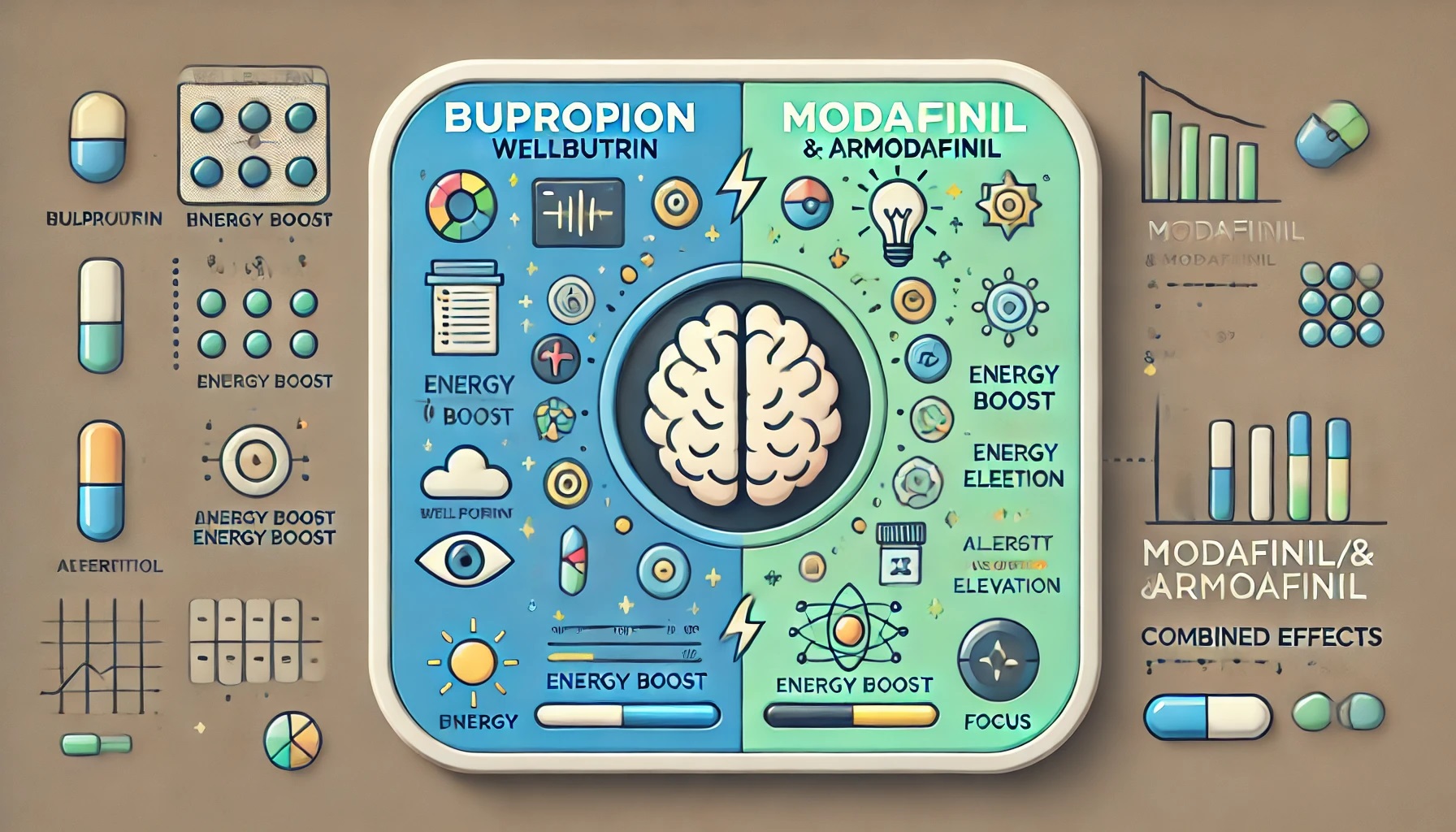Both bupropion and modafinil or armodafinil are prescription medications that have gained popularity for their effectiveness in treating a variety of conditions, including depression, attention deficit hyperactivity disorder (ADHD), and narcolepsy. However, combining these medications, particularly Wellbutrin with modafinil or armodafinil, raises concerns about potential interactions. Understanding how these drugs interact, their combined effects, and potential risks is important for ensuring patient safety and optimizing therapeutic outcomes.
What is Bupropion?
Wellbutrin is an atypical antidepressant primarily used to treat major depressive disorder (MDD) and seasonal affective disorder (SAD). It is also prescribed to help with smoking cessation under the brand name Zyban. Wellbutrin works by inhibiting the reuptake of norepinephrine and dopamine, two neurotransmitters that are critical for regulating mood, motivation, and focus. Unlike other antidepressants, Wellbutrin does not significantly affect serotonin levels, which makes it a suitable option for patients who experience side effects from other medications in this class.
What are Modafinil and Armodafinil?
Modafinil and armodafinil are nzt-like drugs prescribed to treat excessive daytime sleepiness caused by narcolepsy, sleep apnea, and shift work disorder. They are sold under different brand names like Modalert or Waklert. While they share many similarities, armodafinil is considered the “R-enantiomer” of modafinil, meaning it is a more refined form that may offer longer-lasting effects. Both drugs are believed to promote wakefulness by affecting dopamine and other neurotransmitters in the brain, although their exact mechanisms of action remain incompletely understood.
Pharmacokinetic Interactions Between Bupropion and Modafinil or Armodafinil
Pharmacokinetics refers to how the body absorbs, distributes, metabolizes, and eliminates drugs. Both Wellbutrin and modafinil/armodafinil interact with the cytochrome P450 enzyme system in the liver, particularly the CYP2B6 and CYP3A4 enzymes, respectively. The shared metabolic pathway can potentially affect the efficacy and safety of either drug when taken together.
Bupropion’s Impact on Modafinil and Armodafinil:
- Metabolic Interaction: Bupropion inhibits the activity of CYP2B6, an enzyme responsible for breaking down several drugs, including modafinil. This could theoretically lead to higher concentrations of modafinil in the bloodstream, potentially increasing its stimulant effects or side effects, such as anxiety, insomnia, or elevated heart rate. While armodafinil has a less direct interaction with CYP2B6, its effects may still be influenced by Wellbutrin.
- Duration of Effect: The increased concentration of modafinil could extend the duration of wakefulness, leading to possible discomfort in patients already sensitive to stimulants. As a result, it may be necessary to adjust dosages or monitor for any adverse reactions.
Modafinil / Armodafinil’s Impact on Bupropion:
- Impact on Metabolism: Both modafinil and armodafinil have been shown to induce the CYP3A4 enzyme, which can increase the metabolism of other drugs, including Wellbutrin. This could lead to reduced levels of Wellbutrin in the body, potentially diminishing its antidepressant effects. In some cases, higher doses of Wellbutrin may be needed to achieve the desired therapeutic response, but this must be done cautiously due to the risk of seizure (a known side effect of Wellbutrin, particularly at high doses).
Clinical Concerns and Safety Considerations
While the interaction between Bupropion and modafinil or armodafinil is not always dangerous, it requires careful consideration by healthcare providers. The following points taken from users experience should be kept in mind:
- Seizure Risk: One of the most concerning side effects of Bupropion is the increased risk of seizures, particularly at higher doses. Modafinil, although generally considered safe for most people, may amplify this risk when combined with Wellbutrin, especially in those with a history of seizures or other neurological conditions. This necessitates careful monitoring and, in some cases, dosage adjustments.
- Mood and Psychiatric Effects: Both Wellbutrin and modafinil have stimulant-like properties, which may lead to increased anxiety, restlessness, or irritability when taken together. Patients with anxiety disorders or a history of mood swings should discuss their treatment options thoroughly with their doctor before combining these medications.
- Sleep Disturbances: While modafinil and armodafinil are often used to promote wakefulness, they can lead to sleep disturbances or insomnia, particularly when taken late in the day. When combined with Wellbutrin, these sleep-related side effects may be amplified, potentially leading to poor sleep quality and daytime fatigue.
- Heart Health: Both Bupropion and modafinil/armodafinil can have cardiovascular effects, such as raising blood pressure or increasing heart rate. Patients with preexisting heart conditions need to be monitored closely to ensure that these drugs do not exacerbate any cardiovascular issues.
Managing the Combination
To minimize the risks of drug interactions and ensure safety, healthcare providers should take the following steps:
- Individualized Dosing: Dosage adjustments may be necessary to optimize the effects of Wellbutrin and modafinil/armodafinil. For example, starting with lower doses of both medications and gradually increasing them may help mitigate potential side effects.
- Regular Monitoring: Patients taking both medications should be regularly monitored for any signs of adverse effects, particularly seizures, mood changes, or cardiovascular issues. Blood tests may be needed to track drug levels and adjust doses as needed.
- Patient Education: Patients should be educated about the potential side effects and the importance of adhering to prescribed dosages. They should also be instructed to report any unusual symptoms promptly, such as changes in heart rate, blood pressure, or mood.
Potential Benefits of Combining Bupropion with Modafinil or Armodafinil
- Enhanced Cognitive Function: Both Wellbutrin and modafinil/armodafinil improve attention, focus, and mental clarity. Combining them can amplify these cognitive benefits, making the pairing attractive for individuals with ADHD or cognitive impairments related to depression.
- Mood Stabilization: Wellbutrin’s antidepressant effects can complement the motivational and energy-boosting properties of modafinil/armodafinil. This synergy may benefit individuals with treatment-resistant depression or those experiencing low energy and motivation.
- Increased Energy Levels: While Wellbutrin helps combat fatigue associated with depression, modafinil/armodafinil directly promotes wakefulness. Together, they can effectively address both physical and mental lethargy.
- Smoking Cessation and Productivity: The combination may help individuals trying to quit smoking by addressing withdrawal symptoms (via Wellbutrin) and maintaining productivity and focus (via modafinil/armodafinil).
Risks and Side Effects of Combining Bupropion and Modafinil or Armodafinil
While the combination can be beneficial, it is not without risks. Common concerns include:
- Increased Risk of Insomnia: Both medications have stimulating effects, and combining them may disrupt sleep patterns. Individuals should avoid taking these medications late in the day.
- Elevated Anxiety Levels: The stimulating properties of both drugs can exacerbate anxiety symptoms, particularly in individuals prone to anxiety disorders.
- Potential for Overstimulation: Excessive stimulation can lead to restlessness, irritability, and jitteriness, especially if dosages are not carefully managed.
- Seizure Risk: Bupropion is associated with a dose-dependent risk of seizures. Adding modafinil or armodafinil may slightly increase this risk, particularly in individuals with predisposing factors.
- Cardiovascular Concerns: Both medications can increase blood pressure and heart rate. Combining them may heighten these effects, posing risks for individuals with cardiovascular issues.
- Drug Interactions: Both Wellbutrin and modafinil/armodafinil are metabolized by the liver. Combining them could alter their metabolism, potentially affecting efficacy or increasing the likelihood of side effects.
Who May Benefit from the Combination?
- Individuals with Treatment-Resistant Depression: For patients who have not responded adequately to monotherapy with antidepressants, the addition of modafinil/armodafinil may enhance treatment outcomes.
- ADHD Patients: The combination may improve focus, energy, and motivation in patients with ADHD, especially those who do not tolerate traditional stimulant medications.
- Chronic Fatigue Syndrome or Narcolepsy: Patients dealing with persistent fatigue or sleep-related disorders may find the pairing helpful for improving daytime functioning.
Best Practices for Combining Bupropion and Modafinil or Armodafinil
- Consult a Healthcare Professional: Always seek guidance from a physician before combining these medications. Dosage adjustments and careful monitoring are essential.
- Start Low and Go Slow: Begin with the lowest effective doses to minimize side effects and gradually increase as needed under medical supervision.
- Monitor for Side Effects: Keep track of any adverse effects, particularly anxiety, insomnia, or cardiovascular changes. Report these to your healthcare provider promptly.
- Optimize Timing: Taking Wellbutrin in the morning and modafinil/armodafinil early in the day can reduce the risk of insomnia.
- Avoid Additional Stimulants: Limit caffeine and other stimulants to prevent overstimulation.
Conclusion
Combining Bupropion with modafinil or armodafinil can offer benefits in treating conditions like depression and excessive daytime sleepiness. However, the interaction between these drugs requires careful management to avoid adverse effects, such as seizures, mood disturbances, and cardiovascular problems. By understanding the pharmacokinetic interactions and adjusting doses appropriately, healthcare providers can help patients benefit from both medications while minimizing the risks. As always, patients should consult their healthcare provider before starting any new medications or adjusting existing treatments.

